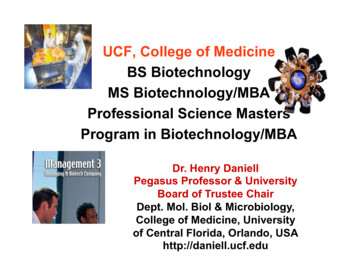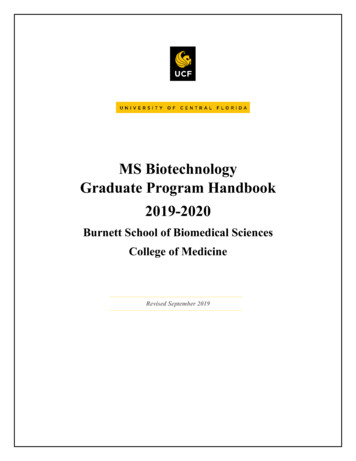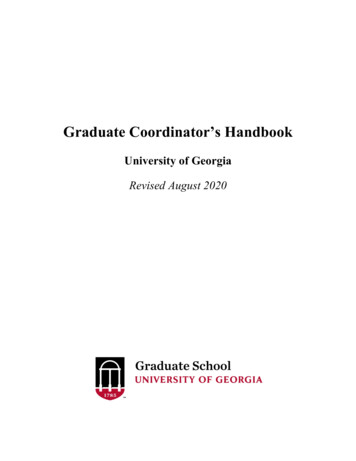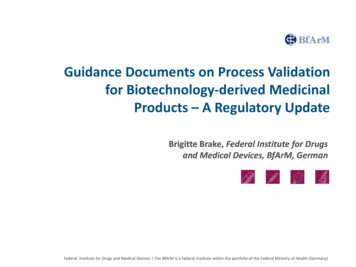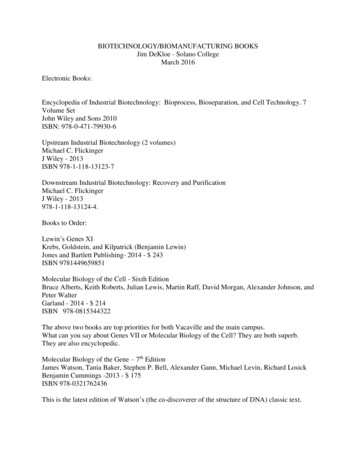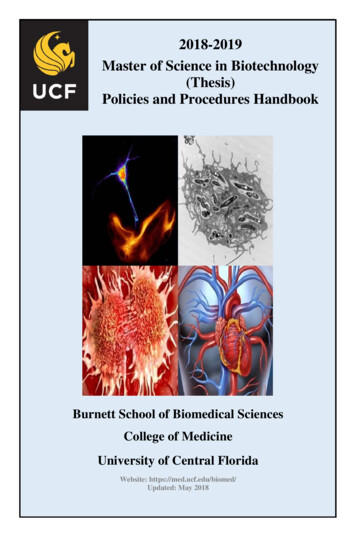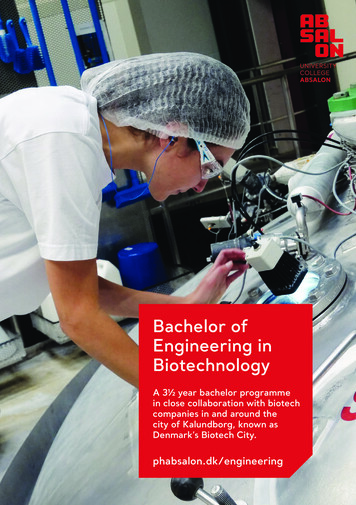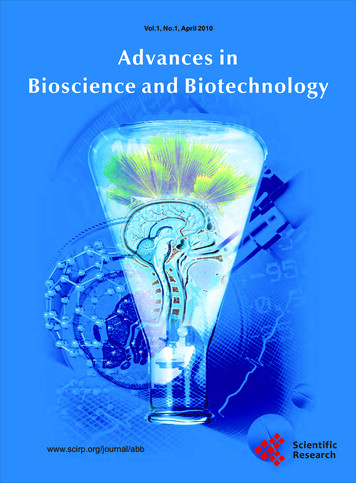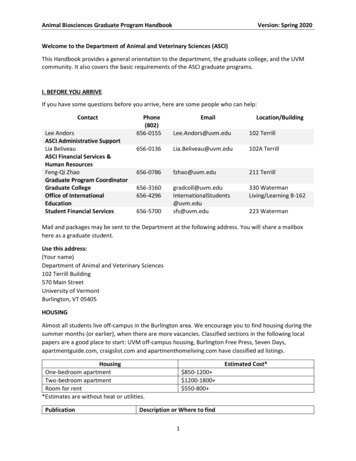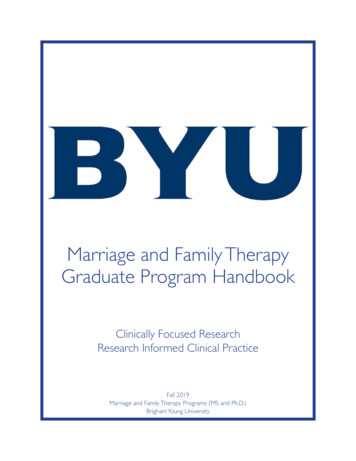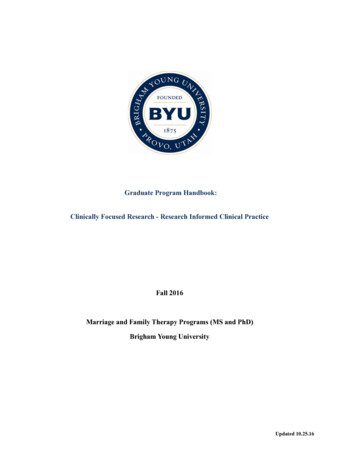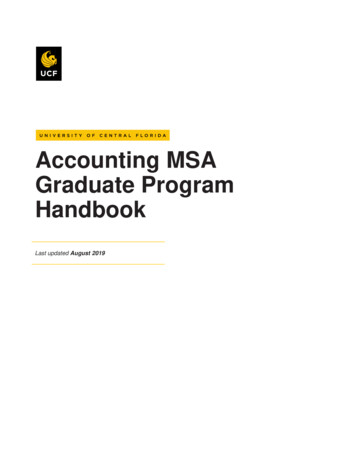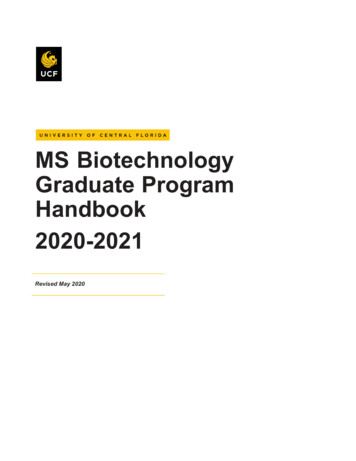
Transcription
MS BiotechnologyGraduate ProgramHandbook2020-2021Revised May 2020
Table of ContentsIntroduction . 1Research Divisions. 3D ivision of Cancer Biology Research . 3D ivision of Immunity and Pathogenesis . 3D ivision of Molecular Microbiology . 3D ivision of Metabolic and Cardiovascular Sciences . 4D ivision of Neuroscience . 4Program Curriculum . 6Suggested Timeline for Completion . 8MS Biotechnology Laboratory Rotation . 9UCF Policy on Academic Honesty and Responsible Research Conduct . 11Thesis Defense . 13Graduation Information . 15Other Program Requirements . 18Graduate Teaching Assistants (GTA) . 22Graduate Student Associations . 24Professional Development . 24Useful Links . 26Graduate Program Faculty . 27Facilities . 30Contact Info . 31The MS Biotechnology Thesis program reserves the right to make any changes or amendmentsto the Program/Handbook information, rules, or policies within the students’ period of study uponmajority approval of the program faculty, director and coordinator.i
Welcome to the Burnett School of Biomedical Sciences, Masters of BiotechnologyGraduate Program at UCF!We are excited that you have chosen UCF and our Graduate Program to continue your training and education inBiomedical Sciences. We offer a wide range of training opportunities in important areas of biomedical researchincluding Cancer Biology, Cardiovascular Disease, Neurosciences and Infectious Disease and Immunology. In thepast years, the Program has grown in the numbers of both students and faculty mentors. Our researchers havealso experienced a rapid rise in our funding for impactful research projects, as well as in our reputation foroutstanding training of the next generation of Biomedical Scientists. We look forward to having you as an importantpart of our Graduate Student Community.Griffith Parks, PhDDirector, Burnett School of Biomedical SciencesDirector, UCF Biomedical Sciences Graduate ProgramProfessor of MedicineUniversity of Central Florida College of Medicine6900 Lake Nona BlvdOrlando, FL 32827Office: (407) 266-7011Cell: (336) 970-1598Griffith.Parks@ucf.eduii
Program Coordinator Introduction & WelcomeWelcome to the Burnett School of Biomedical Sciences Masters of Biotechnology Program. This program isdesigned to give you broad knowledge and training in the scientific and practical aspects of biotechnology. Itinvolves innovative, hands-on and multidisciplinary learning approaches to give you the necessary education andtraining in scientific aspects of biotechnology. The courses and research training required in this program are alsodesigned to develop independent thinking, team work and communication skills, which are highly desirable in thebiotechnology industry.As a new master’s student, you will face many new experiences that can be both rewarding and challenging. Yourstudies will involve foundational coursework and laboratory research. You will have the opportunity to work closelywith faculty members from the Burnett School of Biomedical Sciences (BSBS) as well as other schools and collegeswithin UCF and affiliated partners in the Orlando area.The Biomedical Sciences Masters of Biotechnology Program will prepare you for a career in academic research,higher education or biotechnology. Course work will provide a basic grounding in relevant topics, while hands-onresearch experience will be the cornerstone of your masters training. Expectations are for you to go beyond theassigned classroom readings and use your curiosity to explore new research trends, building a knowledgebase tosupport your career as an independent scientist. Oral presentations and writing assignments will teach you the skillsneeded to effectively communicate your discoveries to the scientific community.In the first year of the program, you will choose an advisor and form a thesis committee that will guide your studiesand prepare you to conduct your own research. Careful selection of a supportive advisor and appropriate thesiscommittee members cannot be overstated. The process of achieving a masters (Thesis) degree will demanddedication and effort that go far beyond your undergraduate experience. The expectations are high but also are theachievements and rewards.The program director, program coordinators, faculty and staff are available to help you succeed in the program.You are encouraged to interact with your peers and to participate in the intellectual life of the university. You havealready made the decision to enter a graduate degree program. This decision commits you to uphold the academicand ethical standards of UCF and the discipline of Biomedical Sciences. If you have any questions or problems,please ask for advice. We are here to help.We wish you all the best of success during your graduate experience at UCF!Office 407.823.0955 Lab407.823.0950Burnett School of Biomedical SciencesBuilding 20, BMS 1364110 Libra DriveOrlando, FL directory/profile/dr-saleh-a-naser/Dr. Saleh Naser,Associate Director &Program CoordinatorSaleh.Naser@ucf.eduEditor-in-ChiefWorld Journal of GastroenterologyFACEBOOKLike us on duatePrograms/iii
MS BiotechnologyTogether, the Graduate Student Handbook and your graduate program handbook should serve as your main guidethroughout your graduate career. The Graduate Student Handbook includes university information, policies,requirements and guidance for all graduate students. Your program handbook describes the details about graduatestudy and requirements in your specific program. While both of these handbooks are wonderful resources, knowthat you are always welcome to talk with faculty and staff in your program and in the Graduate College.The central activities and missions of a university rest upon the fundamental assumption that all members of theuniversity community conduct themselves in accordance with a strict adherence to academic and scholarly integrity.As a graduate student and member of the university community, you are expected to display the highest standardsof academic and personal integrity.Here are some resources to help you better understand your responsibilities: Academic HonestyAcademic Integrity Training - Open to all graduate students at no costPlagiarismIntroductionMission Statement and OverviewMission: The Biomedical Sciences graduate program at the University of Central Florida, College of Medicineprovides the highest quality education and research opportunities for training the next generation of biomedicalscientists.The MS Biotechnology program enriched with graduate faculty with diverse investigative biomedical researchinterest and highly qualified students who are pursuing top education and cutting edge grams/ms-biotechnology/The Graduate Faculty includes over 100 reputable scientists with established achievements in diverse aspects ofbiomedical sciences including metabolic disorders, cardiovascular sciences, infectious disease, neuroscience,cancer, nanoscience, biomedical engineering, drug discovery, and much raduate-faculty/.Our students are recruited from outstanding programs from all over the United States and over 18 other countries.They are supported by competitive scholarships and prestigious fellowships. Our students receive top tiereducation, rigorous training in basic and clinical research, outstanding mentoring, and lifelong professionaldevelopment. They become well trained in research and regulations while conducting experiments involving theuse of human subjects and animals. They learn, retain, and apply fundamental knowledge in biomedical sciences.They graduate from the program as scientists with excellent education, research training, and focused career goals.Many go on as postdoctoral fellows, academics, scientists, and researchers.Visit: aretheynow/The curriculum of the MS Biotechnology program is continuously adapting to rapid changes in technology, science,ongoing research, public health, and evolving microbiome and genetic discoveries. All students must successfullycomplete core courses with a focus on fundamental knowledge in molecular and cell biology, microbiology,biochemistry, immunology, neuroscience, bioinformatics, stem cell, metabolic, cancer, drug discovery and delivery,and more.1
The program administrators, faculty and staff are dedicated to educate, train, and mentor tomorrows scientists andfuture colleagues and collaborators. Our Graduate Student Association plays the big brother/sister role tocomplements the role of our faculty to help our students feel at home and succeed.MS Biotechnology DegreeMS Biotechnology students will graduate with a Master’s of Science in Biotechnology degree.Student Responsibility to Keep InformedIt is the student's responsibility to keep informed of all rules, regulations, and procedures required for graduatestudies. Graduate program regulations will not be waived or exceptions granted because students plead ignoranceof the regulations or claim failure of the adviser to keep them informed.Student Accessibility ServicesStudent Accessibility Services (SAS) views disabilities as an integral part of the rich diversity at the University ofCentral Florida. To that end, we work collaboratively with students, faculty, and staff to create an inclusiveeducational environment for students. BSBS students with disabilities must contact the professor at the beginning/orprior to the semester to discuss the needed accommodations. Students who need accommodations must beregistered with the Student Accessibility Services office. For more information, please contact sas@ucf.edu or (407)823-2371.UCF Golden RuleThe Golden Rule Student Handbook is a compilation of various policies and procedures from 10 different UCFdepartments and was specifically created to provide the answers to many of your questions regarding Universityrules and regulations. This publication attempts to define your rights and responsibilities and give you a betterunderstanding of your role as a member of the UCF community. http://goldenrule.sdes.ucf.edu/BSBS Program OrientationAll new graduate students are required to attend our New Graduate Student Orientation, which is held one weekbefore Fall classes begin. Graduate students will meet with program leaders who will give an overview of theprogram choreography, guidelines, and expectations for the BSBS graduate program. New graduate students willalso attend our Welcome Colloquium, financial/contract information session and complete all program orientationrequirements including lab & safety and animal safety training.2
Research DivisionsDivision of Cancer Biology ResearchResearchers in the Division of Cancer Research are on the vanguard of cancer biology, investigating: How patients’ genes play a role in their cancer risk. What causes cancer and cancer metastasis. How cancer cells communicate with the neighboring normal cells. The epigenetic changes that play a role in developing drug resistance. Discovering new ways to harness the immune system to fight cancer. Identifying new targets for companion diagnostics with treatments that reduce side r-research/Division of Immunity and PathogenesisThe mission of the Immunity and Pathogenesis Division is elucidation of the cellular and molecular mechanismsat the interface of infection, inflammation and immunity. Our group has broad interest and expertise in microbialpathogenesis, innate immunity, inflammatory signaling pathways and immunological memory.Discoveries are being translated into innovative diagnostics, vaccines, and therapeutic strategies to improvehuman health.Projects are related to:Respiratory diseases (Mycobacterium tuberculosis, non-tuberculous mycobacteria, influenza,parainfluenza, respiratory syncytial virus and asthma) Sexually transmitted diseases (Chlamydia trachomatis, human papilloma virus and Zika virus) Vector-borne diseases (Lyme disease and emerging vector borne viruses) Inflammatory diseases (Inflammatory bowel disease, peritonitis, autoimmune arthritis ons/immunity-and-pathogenesis/ Division of Molecular MicrobiologyThe Division of Molecular Microbiology conducts basic and applied research related to bacterial, parasitic, andviral diseases that are of major public health concern. Research is focused in two broad areas: Understanding the fundamental principles of microbial pathogenesis.Development of next-generation antimicrobial drugs.Topics of interest include HIV, tuberculosis, malaria, mechanisms of antimicrobial resistance, evolution ofbacterial pathogens, genomic epidemiology, enteric diseases, toxins, and diagnostics. Student training anddevelopment are integral components of faculty ar-microbiology/3
Division of Metabolic and Cardiovascular SciencesThe Metabolic and Cardiovascular Research Division focuses on understanding the pathogenesis, molecularmechanisms and cell signaling of metabolic and heart diseases and to bring translational research into the clinicalenvironment to serve our community.Major Areas of Research Metabolic syndrome in diabetes and aging Interactions of lipids and lipoproteins in atherosclerosis Inflammation in cardiac diseases (Myocardial infarction, heart failure, atherosclerosis) Vascular and angiogenesis in cardiac diseases Biological energy metabolism Oxidative stress, free radical and reactive oxygen species Mitochondrial alterations pathophysiology of cardiac diseases Molecular and cellular cardiology Regenerative medicine (stem cells) in heart diseases Cardiac genetic and non-genetic disease modeling using 3D printing Tissue engineering and drug toxicity with 3D printed scaffolds Cardiovascular epidemiology and public ascular/Division of NeuroscienceThe mission of the Neuroscience Division is to discover cellular and molecular mechanisms that govern functionof the nervous system. This knowledge is then applied to expand understanding of how neurological disordersarise and may be treated.The division’s researchers are conducting cutting-edge research on: Neurodegenerative diseases (Amyotrophic lateral sclerosis (ALS), Huntington’s, Parkinson’s andAlzheimer’s Diseases)Cerebrovascular diseases (Stroke and cerebral ischemia)Traumatic brain injury and chronic traumatic encephalopathy (CTE) caused by concussionAxonal transportation dysfunctions (Charcot-Marie-Tooth disease (CMT), Perry syndrome, distal spinaland bulbar muscular atrophy)Sleep apneaDiabetes and aging-induced cardiac neuropathyBrain cancer such as glioblastoma multiforme (GBM) and neuroblastomaOptic nerve damageNeurofibromatosis Type 2 and schwannomatosisCancers of the head and neck including oral cancerRegenerative medicine and stem cell therapiesBrain machine interfaceInduced pluripotent stem (iPS) cellsFaculty collaborate with local physicians and UCF researchers (Multidisciplinary Neuroscience Alliance (MDNA,https://med.ucf.edu/mdna/)). They are working with Mechanical Engineering, Electrical Engineering, ComputerScience, the Prosthetic Interfaces faculty cluster, Nanoscience Technology Center, Material Sciences, College ofArts and Humanity, College of Optics and Photonics, and Psychology in UCF. Collaborators also include scientistsand physicians from HCA Healthcare, the Veterans Affairs Medical Center, Nemours Children’s Hospital, andAdventHealth (Florida Hospital), Orlando Health and other local clinics, which enrich the clinical and translationalresearch environment in the Neuroscience ience/4
5
Program CurriculumThe Master of Science in Biotechnology program in the College of Medicine will prepare students to function in theindustrial biotechnology environment. This program is designed to give students broad knowledge and training inthe scientific and practical aspects of biotechnology.The Master of Science in Biotechnology program consists of a minimum of 30 semester credit hours of graduatecourses offered by the Burnett School of Biomedical Sciences in the College of Medicine that includes 21 credithours minimum of required courses, 3 credits of restricted electives, and 6 credit hours of thesis research. Thisprogram is designed to give students broad knowledge and training in the scientific and practical aspects ofbiotechnology.What makes this program unique is the focus on practical training offered to graduate students through master’sthesis research in molecular biotechnology to perform jobs in laboratory environment that require scientific talent.Total credit hours required: 30 credit hours minimum beyond the bachelor’s degreeRequired Courses—21 Credit HoursCo
within UCF and affiliated partners in the Orlando area. The Biomedical Sciences Masters of Biotechnology Program will prepare you for a career in academic research, higher education or biotechnology. Course work will provide a basic grounding in relevant topics, while hands-on research exp
